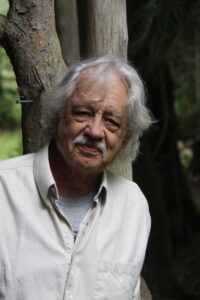The plot to kill Frederick C. Trudd
The Long-Shot Trial: An Arthur Beauchamp Thriller
by William Deverell
Toronto: ECW Press, 2024
$26.95 / 9781770417540
Reviewed by Bill Paul
*

Retired Vancouver criminal lawyer Arthur Beauchamp is piecing together his memories of a sensational, small town murder trial that took place in the mid-1960s. At the time Beauchamp was a twenty-nine year-old defence lawyer for the accused, a young woman named Angelina Santos. The case was viewed as unwinnable and dumped in Beauchamp’s lap. And now to his surprise more than fifty years later this famous case—with “its twists and riddles and sworn secrets”—is being hashed over in a soon to be published, unauthorized biography of Beauchamp.
In the biography, writer Wentworth Chance promises to reveal new information about the ending of the controversial trial that left many who participated shaking their heads and second-guessing the young defence lawyer’s decisions. Beauchamp is left with only one choice. It’s time to clear the air, go through his notebooks and transcripts from the trial, and give his account of the “most significant trial of his career.” Ladies and gentleman of the reading public, this is the premise of William Deverell’s latest novel, The Long-Shot Trial.
The trial, known as Regina vs Angelina Santos, turned on the question: did Santos point a loaded Remington 700 rifle at her employer, Frederick C. Trudd, and shoot him dead in his backyard garage? Or was there reasonable doubt that someone else could have shot him? The story unfolds as a courtroom drama in the small town community of Fort Thompson next to the Yukon and British Columbia border. Fort Thompson is a warts-and-all fictional town with its share of citizens who own hunting rifles. In many ways Santos and Trudd (rhymes with crud) represent two opposing symbolic forces in the novel: heroine versus villain, indigenous versus settler.
Beauchamp narrates the investigative-style plot step by step. With his gift for observation and exaggeration he introduces an ensemble of characters and retells the back-and-forth arguments he had with Crown prosecutor Eddie Santoreni and Judge Wilbert Kroop. The plot has all the ingredients of an entertaining legal thriller: attention to court procedure, surprise witnesses, undisclosed information and revelations that carry the novel to its conclusion.
As the case dragged on decades earlier, Beauchamp became more and more conflicted. Maybe there was more to the case than he realized.
Originally from the Philippines, eighteen-year-old Angelina Santos immigrated to Canada in 1964 and found work as Frederick C. Trudd’s housekeeper. A devout Catholic who volunteered at the local food bank and Elder Care Society, Santos sent money home to her ailing mother. For Beauchamp, Angelina was pious person who lacked guile. When asked why she may have killed Trudd with one of his rifles she said it was because he had raped her and threatened to tell her mother that she was a dirty whore. “I think I shot Mr. Trudd and he’s dead,” she declared.

Many who live in Fort Thompson rallied behind Santos in part due to Trudd’s reputation as a first-rate scoundrel. At last count he was the owner of a sawmill and several small business on Main Street; over the years he developed a reputation as a hard-drinking and greedy businessman intent on buying up local real estate. He was twice divorced, estranged from his two sisters, Donalda and Hortense, and when he drank he tended to go off the rails. So, yes, he could be abrasive and made his share of enemies; but some believed he wouldn’t go as far as to rape his housekeeper.
What ever way you look at it, it was a trial that divided the town. Both Santos and Trudd had their defenders and detractors. Doubts and questions persisted. Could Trudd’s two sisters be upset that they were left out of his will? What about the dispute between Trudd Enterprises and the Wolf River Reserve Band Council over a thousand acres of old-growth white spruce that the band council claimed as their traditional land? Did someone at the negotiating table threaten Trudd’s life? Lastly, if Angelina was pregnant maybe it had nothing to do with Trudd. Perhaps she was secretly seeing someone.
In the ‘60s, Beauchamp was an outsider, “a big city liberal….a young hotshot.” He worried that if he followed a certain line of reasoning that he’d be seen as pursuing a racist defence by casting suspicion on a member of the Wolf River Reserve. But on the other hand he needed to build a credible defence for his client. Yet there are times when he doubted Santos’ version of events. As well, were the townspeople having one over on him? What did they know about the case that he doesn’t know? At a midway point during the trial Beauchamp remarked: “Too many questions. No compelling answers.”
North Pender Island’s Deverell (Stung) is skilled at building tension in the courtroom and mixing it with descriptions of Beauchamp mulling over legal strategies or trying to understand the finer points of what happens when someone (Trudd) dies without leaving a legal will. He introduces secondary characters who are tagged with Dickensian-like names (such as local lawyer Hogarth W. Johnson) and they add a perspective that’s different from Beauchamp’s limited point of view. The plot includes bits of social commentary on land rights, class privilege, racism, and sexual assault. As he’s been doing successfully for the past forty years or so, the veteran crime fiction writer keeps the plot moving and the reader guessing.
In stating the obvious, it’s easy to be carried away by Deverell’s storytelling skills. He’s a raconteur. This is the ninth Arthur Beauchamp novel and it’s similar to one of the earlier novels, Sing A Worried Song (2015). In both books, Beauchamp learns the hard way that certain trials offer a “thorny thicket of possibilities.” The recounting of the Regina vs Angelina Santos trial reminds him of how he fell victim to his own idealism. Yet despite being outmaneuvered, Beauchamp proves to be both shrewd and compassionate. The ending is expected but nonetheless carries a dramatic punch.
[Editor’s note: William Deverell will launch his novel at Salt Spring Island Public Library 7pm, on Tuesday, June 11; he’ll appear for a book-signing at Munro’s Books in Victoria 12-1:30pm, on Saturday, June 15.]
*
East Vancouverite Bill Paul enjoys photography and reading fiction and nonfiction. [Editor’s note: Bill Paul has reviewed books by Deryn Collier, Jann Everard, Jack Lowe-Carbell, Martin West, Dietrich Kalteis, Suzannah Showler, Curtis LeBlanc, Patrick deWitt, Barbara Fradkin, Dietrich Kalteis, Stan Rogal, Keath Fraser, and John Farrow, and contributed a photo-essay, Trevor Martin’s Vancouver, to BCR.]
*
The British Columbia Review
Interim Editors, 2023-25: Trevor Marc Hughes (non-fiction), Brett Josef Grubisic (fiction and poetry)
Publisher: Richard Mackie
Formerly The Ormsby Review, The British Columbia Review is an online book review and journal service for BC writers and readers. The Advisory Board now consists of Jean Barman, Wade Davis, Robin Fisher, Barry Gough, Hugh Johnston, Kathy Mezei, Patricia Roy, Maria Tippett, and Graeme Wynn. Provincial Government Patron (since September 2018): Creative BC. Honorary Patron: Yosef Wosk. Scholarly Patron: SFU Graduate Liberal Studies. The British Columbia Review was founded in 2016 by Richard Mackie and Alan Twigg.
“Only connect.” – E.M. Forster






























